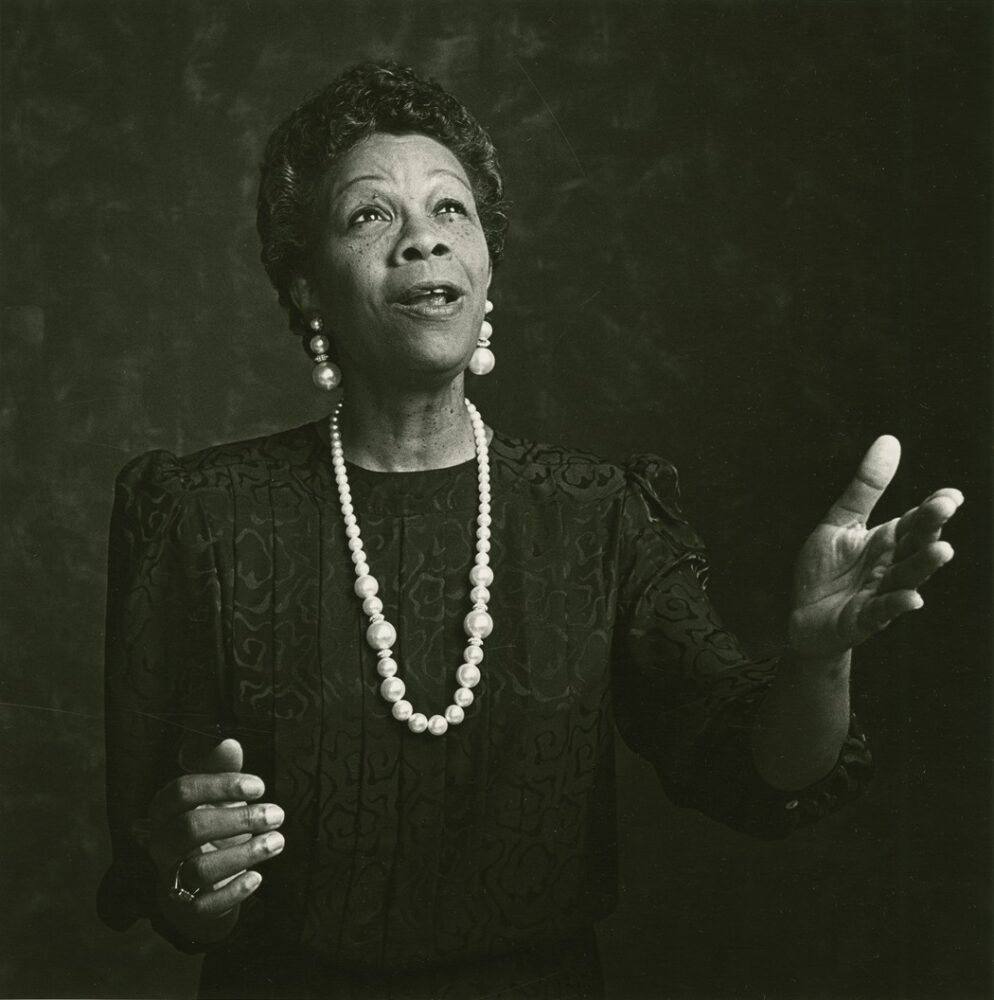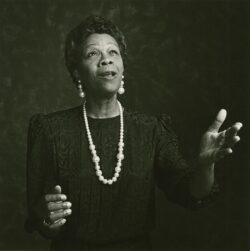Voice as Instrument
The improvisational artistry of Germaine Bazzle
Published: February 29, 2024
Last Updated: June 1, 2024

Photo by Rick Olivier, The Historic New Orleans Collection
Bazzle in 1988.
Germaine Bazzle is best known for her expertise at scat-singing, an approach in which vocalists forgo words and lyrics to instead use their voices as non-verbal instruments. Scat singers often employ extremely sophisticated and intricate techniques that pair perfectly with the deft work of the instrumentalists with whom they perform. Scatting in jazz can be traced back at least as far as Louis Armstrong’s early recordings from the 1920s. It was widely popularized later in the twentieth century by such masterful singers as Ella Fitzgerald.
Fitzgerald was one important influence on Bazzle, who became a serious student of vocal jazz as a teenager, in the 1950s. She learned in part by repeatedly listening to long-playing records with rapt attention. As Bazzle told the musician, educator, and jazz historian Monk Rowe in a transcribed interview from 2006, posted on the website of Hamilton College, “Youngsters don’t know about these thirty-three-and-a-thirds, but that’s what we had. Ella Fitzgerald, Sarah Vaughan, Charlie Parker, Miles Davis. My brother would put on records and everyone would sit in the living room and listen, you know. Nobody would talk over a whisper. People like Nat Perrilliat [known as ‘the John Coltrane of New Orleans’] used to come over and we’d listen to the instrumentalists. It would stay very quiet . . . I think Ella Fitzgerald’s ‘A-Tisket, A-Tasket’ was the first song that influenced my singing.”
Like many beginning musicians, Bazzle initially imitated her idols. “But,” she explained to Rowe, “for me to learn how to do what I do, especially with the scatting, came from listening to instrumentalists more than vocalists. With Ella Fitzgerald and Sarah Vaughan . . . at one time I had to stop listening to them because I found myself almost trying to do their things, doing their music. And I said but it’s not mine. It’s not me yet.” Other singers whom the eclectic Bazzle admires include Betty Carter, Dinah Washington, Billy Eckstine, Frank Sinatra, Willie Nelson, and Kenny Rogers.
“Every song has a story to tell and what you hear is my interpretation of the story. It’s as if I were talking to someone. It’s really a musical conversation.”
Duke Ellington, Billy Strayhorn, Cole Porter, and George Gershwin stand among the songwriters whose work Bazzle especially loves to perform. Although long gone, their contributions to the loosely defined Great American Songbook live on as perennial classics. As Gwen Thompkins—executive producer and host of public radio’s Music Inside Out—observed in 2020, “What Miss Bazzle does best is make old songs [sound] like [they’re] new. No one can blow the cobwebs off of a standard like she can.”
Germaine Bazzle was born in New Orleans in 1932 and spent part of her childhood in New Orleans’s Tremé district, “where a lot of the music is and where it really came from,” she told me in a 2014 interview. “It was understood that this is a part of you, this is a part of what we do.” Bazzle began her musical studies in Xavier University’s Junior School of Music Orchestra and went on to graduate as a music major from Xavier University, where jazz was just one facet of her focus. “I learned to sing the classics,” she recalled, “such as Schubert, Brahms—and also participated in the opera . . . It allowed me to appreciate the whole spectrum.”
In the 1950s, after college, Bazzle taught in Thibodaux where, she told me, “I was able to accomplish all the things that I wanted to with my students. I did an operetta, Handel’s Christmas oratorio ‘The Messiah,’ [works by] Beethoven.” At the same time, Bazzle felt equally compelled to perform outside of her classroom, charming audiences with her vocal dexterity and elegant, joyous stage presence. She played bass and sang standards, jazz, and miscellaneous popular material at a club “where couples came to dance.” After moving back to New Orleans in the 1960s, Bazzle performed for years at venues such as Mason’s VIP Lounge and, later, at Snug Harbor. She worked with jazz luminaries including saxophonists Alvin “Red” Tyler and Victor Goines; pianists Ellis Marsalis, David Torkanowsky, and Larry Sieberth; trumpeter Gregory Davis; and drummers Herlin Riley and Johnny Vidacovich, to name but a few. In 2020, speaking fondly of her compatriots, Bazzle told Gwen Thompkins, “Very seldom do we do the same song the same way twice” on classics such as “Route 66,” “Lullaby of Birdland,” and “It Don’t Mean a Thing (If It Ain’t Got That Swing).” Bazzle explained that a song like “When You’re Smiling” can be played “slowly . . . up-tempo . . . second line . . . or fox trot. Any kind of dance you want to do on that tune.”
Unlike many of her world-traveling colleagues who attained global recognition, Bazzle chose not to tour extensively. “That’s a hard, hard thing to do,” she told Keith Spera of the Times-Picayune in 2022, “especially if you’re the only woman with a group of guys. I’m not cut out for that.” In addition, Bazzle wanted to stay close to home to focus on teaching at Xavier University Preparatory School and giving private lessons. She recorded for companies including All For One—New Orleans’s pioneering Black-owned label—and Rounder.
“Performing,” Bazzle told me, “is my therapy. I get rid of all my frustrations, all my hang-ups. It whets my appetite . . . Every song has a story to tell and what you hear is my interpretation of the story. It’s as if I were talking to someone. It’s really a musical conversation.” At this writing Bazzle is 92, and it’s unclear whether she will continue to sing in public. Her many fans and admiring fellow musicians fervently hope so. If not, Bazzle’s admirers can find a wide variety of her recordings and live performances on websites such as YouTube.
Ben Sandmel is a New Orleans–based writer, folklorist, and producer. The former drummer for the Grammy-nominated Cajun/country band The Hackberry Ramblers, Sandmel is also the author of Ernie K-Doe: The R&B Emperor of New Orleans. In May 2018 the LEH honored Sandmel with an award for his Lifetime Contributions to the Humanities. In August 2021 Sandmel graduated from Tulane University with an MA in musicology.
